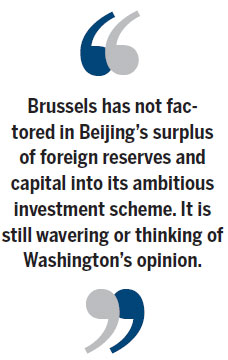Let words of conflict be put to rest
Updated: 2015-05-01 08:05
By Fu Jing(China Daily Europe)
|
|||||||||||
Debates about where the world is heading should reflect context and developments
In the domain of international political and economic relations, academics have the habit of using belligerent words, such as war or duel, to trigger misleading debates that may not reflect reality.
When discussing topics that link China with its global partners - including the United States, the European Union and its Asian neighbors - scholars outside China have become more inclined to use provocative language to lure their audience and reveal their way of thinking.
It happens frequently when China-related discussions are held. For example, organizers of a seminar at the Institute for European Studies in Brussels asked their speakers and audience if China's investment in Europe's energy sector was a blessing or a threat.

But another seminar, also held in Brussels in April, described the relationship between China and the US as the duel of the century, a scenario ruled out by China's Ambassador to Belgium, Qu Xing, at the event. China had never engaged in a war with others to solidify its power, he said.
At the start of this year Jonathan Holslag, of the Brussels Institute of Contemporary China Studies, organized a debate about his book China's Coming War with Asia. Qu, who was invited to speak, rejected Holslag's assertion, suggesting the writer should at least have added a question mark in the book's title if he really wanted to attract readers.
I was asked to comment on China's investment in the EU, especially in the renewable energy source sector.
The speaker painted a picture of China's investment activities in the solar and wind farm sectors in Europe up to 2014. A lot of information came out during the two-hour event.
But the seminar would have been more meaningful and helpful if such conversation and debate had lasted longer and reflected the changing context of both sides.
Like Qu, I also disliked the word threat being used in the description of this event. Obviously, the value of China's investment activities is much less than that of Europeans in China. In fact, the Chinese have only just begun to invest in Europe at a bigger scale in the past five or six years; Europeans have done that in China for decades.
The energy seminar coincided with the European Investment Bank announcing its first phase of projects under the European Commission's three-year, 315 billion euro ($342 billion) investment plan. The bank could only mobilize 800 million euros. By contrast, China and Pakistan entered into a multi-billion dollar cooperation agreement to develop the latter's infrastructure projects that same week.
Brussels has not factored in Beijing's surplus of foreign reserves and capital into its ambitious investment scheme. It is still wavering or thinking of Washington's opinion.

It is ill-advised to use the word threat when talking about China's expanding economic activities in Europe if the continent really wants to involve Beijing as a way of getting out of economic trouble.
With the looming 40th anniversary of diplomatic relations between the EU and China I propose that scholars and thinkers on both sides should form a new context, a new concept and new narratives when debating.
Beijing has no interest in war, hegemony and colonialism. The key words in its dictionary of foreign relations are peace, development, cooperation and win-win.
In the past few years Beijing has staged two "clean campaigns" that, in my view, that no foreign scholar interested in China can afford to ignore. One is the anti-corruption drive to clean up the country's leadership and the other is the concept of the economic new normal, a slowdown in the pace of economic growth.
Beijing has also ushered in Silk Road proposals to boost economic collaboration and development along the ancient trading route, and the agreement with Pakistan was the first step to materialize President Xi Jinping's idea.
So these developments should be put into context in order to have constructive debates and for new themes to be found. For example, how to bring Beijing and Brussels together to match their investment and expansion needs is an urgent matter.
But once again, wording is key if academia wants to find common ground between Beijing and Brussels. Otherwise, academia will help to create distance rather than closeness.
The author is China Daily chief correspondent in Brussels. Contact the writer at fujing@chinadaily.com.cn
(China Daily European Weekly 05/01/2015 page13)
Today's Top News
Protest against police violence expands to NYC
Milan tightens security ahead of Expo opening
Chinese scientists discover 'batman dinosaur'
China trainmakers seek control of Bombardier's rail unit
US Senate rejects bid to toughen Iran nuclear review bill
New Zealand voices dismay at executions in Indonesia
China hits out as Abe visits the US
No hiding place overseas for fugitive officials
Hot Topics
Lunar probe , China growth forecasts, Emission rules get tougher, China seen through 'colored lens', International board,
Editor's Picks

|

|

|

|

|

|






